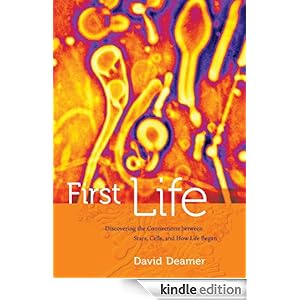A few months ago I met the editor of Books & Culture (one of my favorite periodicals) at a meeting. I told him that I've been a subscriber since the inception of the publication, and I'd love to write something for it sometime. I had actually submitted a query two times before without much success, I told him. Perhaps that got him to have some pity on a (very) minor scholar like myself, and he said he'd send me something sometime. Well that time came a few weeks ago in the form of a book on astrobiology: First Life, by David Deamer. Understanding that I might not get another chance, I accepted the assignment to write a 1500 word review essay. I turned it in this morning. So hopefully it will be accepted and published in an upcoming issue.
"What do I know about astrobiology?" you may ask. The answer is: a lot more now than I did before. Astrobiology pursues the twin goals of seeking life elsewhere in the universe, and trying to understand how life might have formed on our own planet. I didn't actually engage the science of the book very much, because I'm certainly no expert on that. Instead, I addressed the issue of how answering this question relates to the theological explanation of the origin of life of the planet, namely, God the Creator. So the article was mostly some reflection on the relationship between scientific and theological explanations. The short of it is: I don't think it poses a threat to our theology to also pursue scientific explanations. Of course there can be points of tension between scientific and theological explanations, but as long as we're not dealing with scientists who are faithful followers of the quasi-religion of scientism, then there is plenty of space for us religious types to pursue theology as well.
"What do I know about astrobiology?" you may ask. The answer is: a lot more now than I did before. Astrobiology pursues the twin goals of seeking life elsewhere in the universe, and trying to understand how life might have formed on our own planet. I didn't actually engage the science of the book very much, because I'm certainly no expert on that. Instead, I addressed the issue of how answering this question relates to the theological explanation of the origin of life of the planet, namely, God the Creator. So the article was mostly some reflection on the relationship between scientific and theological explanations. The short of it is: I don't think it poses a threat to our theology to also pursue scientific explanations. Of course there can be points of tension between scientific and theological explanations, but as long as we're not dealing with scientists who are faithful followers of the quasi-religion of scientism, then there is plenty of space for us religious types to pursue theology as well.

1 comment:
I discovered Books & Culture when I moved to Illinois, and it has quickly become my favorite magazine (and the only one I read cover to cover). My friends and I keep track of our "John Wilson sightings," too. I still haven't worked up the courage to talk to him the few times I've seen him at the tea shop.
This is exciting news to me. I'll look for your article in a future edition!
Post a Comment